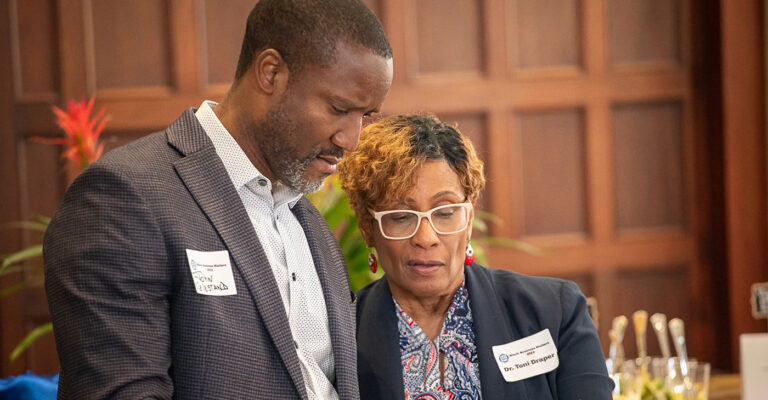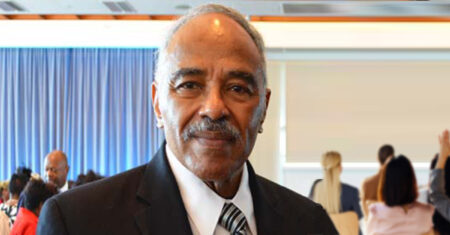By John Celestand | Word in Black | The AFRO
John Celestand is the program director of the Knight x LMA BloomLab, a $3.2 million initiative that supports the advancement and sustainability of local Black-owned news publications. He is a former freelance sports broadcaster and writer who covered the NBA and college basketball for multiple networks such as ESPN Regional Television, SNY, and Comcast Sportsnet Philadelphia. John was a member of the 2000 Los Angeles Lakers NBA Championship Team, playing alongside the late great Kobe Bryant and Shaquille O’Neal. He currently resides in Silver Spring, Maryland, with his wife and son. Credit: Courtesy photo
Back in early March, in a statement released on social media, legendary Dallas Cowboys running back Emmitt Smith blasted his alma mater, the University of Florida, for eliminating its diversity, equity, and inclusion program. Smith warned minority athletes at Florida to “please be aware and vocal” about the decision the university was making, which in essence meant closing the doors on students of color.
A few days later, NAACP president and CEO Derrick Johnson asked “current and prospective” student-athletes to “reconsider any potential decision to attend, and compete at a predominantly white institution in the state of Florida.” He pointed out that “these institutions reap considerable financial benefits from the very individuals they fail to stand by in matters of diversity, equity, and inclusion.”
So, should Black athletes refuse to attend schools that defund DEI?
After all, today’s athletes command major coin when it comes to NIL (name, image, and likeness) dollars. Their ability to enter the portal and transfer to other universities without repercussion could, if leveraged correctly, have a tremendous influence on how universities handle DEI.
The question came up again this week for me after news broke that the University of North Carolina, Chapel Hill, plans to divert the school’s entire $2.3M DEI budget toward public safety and policing.
Basically, UNC “said that the opposite of funding DEI programming is funding police,” writer, researcher, and Harvard Kennedy fellow Anna Gifty Opoku-Agyeman wrote on X this week.
North Carolina brought in nearly $123 million in revenue from athletics in 2022. If every Black athlete at the school refused to play until the DEI budget was restored, that would undoubtedly put pressure on the school.
But even though today’s college athletes are in a prime position to effect change around DEI at universities because of their platforms, power, and heavy influence, is this really their responsibility?
Who should stand up for DEI?
“I don’t think it is their responsibility” says Leashia Lewis, assistant athletic director for diversity equity and inclusion at Villanova University.“They have an opportunity to use their platform and voices to make change, but it is also the responsibility of athletic departments to support them in doing that. My question would be, are athletic departments willing to or in a position to support student-athletes when they have something to say or want to fight for change?”
There’s also the reality that Black athletes of the past were fighting for basic civil rights, which made it easier to think from a collective standpoint.
“The risk of being a social justice activist and using your platform is different now. Many student-athletes are not willing to take the risk,” Lewis says.
“The risk is playing time, reputation, belief that your coach may see you as an outcast —, especially if you are not the superstar. There is also their personal branding and NIL deals they may not want to risk. Especially for football and basketball players who have the highest platforms. Some of them are not prepared to take that risk.”
How did we get here?
The murder of George Floyd on May 25, 2020, opened a floodgate of pledges to support DEI across corporate America and beyond. Companies and universities jostled to be first in line to beat their chests and voice their support and commitment to increasing opportunities to hire, accept, and retain people from underrepresented, underprivileged, and less advantaged communities.
I was always skeptical. I kept waiting for the other shoe to drop. And now it has — falling harder than Humpty Dumpty ever did.
In 2023, Florida, under the leadership of Republican Gov. Ron DeSantis, became one of the first states to enact a law restricting DEI efforts. It banned the state’s public universities from spending money on DEI initiatives and placed restrictions on how educators could discuss discrimination in mandatory courses. Texas, North Carolina, and North Dakota passed similar bills later in the year. So far in 2024, Idaho, Utah, Wyoming, and Alabama have passed bills that are set to go into effect July 1.
The University of Texas and Alabama are both ranked in the top five of the AP Top 25 College Football Poll. According to USA Today’s tracking, in 2022, these schools brought in over $239 million and $214 million, respectively.
Translation: Athletes most definitely have some pull.
Athletes have always been on the frontlines.
Athletes and college students have almost always been on the frontline of change. Many professional athletes, such as Muhammad Ali, Bill Russell, Jim Brown, Mahmoud Abdul-Rauf, Colin Kaepernick, Tommie Smith, and John Carlos, took stances but also sacrificed their personal lives and careers.
“Historically, athletes have used their platforms to speak for justice or to make change and bring attention to injustices that are in our society,” Lewis says.
“Much of the DEI work in athletics right now has existed as a result of athletes speaking up in response to Colin Kaepernick in 2017 taking a knee and also in response to George Floyd being murdered,” she says.
As everyone knows, though, Kaepernick’s football career was destroyed by his decision to protest.
Is this what we are expecting of today’s college athletes?
What if they are prepared to take that risk?
“Right now, the climate in college athletics across the country in terms of DEI is not as active as it was in 2020,” Lewis says. “There are other things taking priority now like NIL, the transfer portal, unionizing the student-athlete, and having them be considered employees for the institution.”
There is no definitive answer to this dilemma. If student-athletes covet their individual earnings and opportunities more than the collective justice for the silent, minoritized, and marginalized communities lacking the power to speak up for themselves, then the conversation about risk doesn’t matter.
And riddle me this: What would I have done back when I was a student-athlete in the late 1990s if I had a million-dollar NIL deal on the table?
Would I have sacrificed for the collective? If that were the case, then should I have even been asked to?
Lewis doesn’t believe so.
“My call to action is to the ecosystem around them,” she says. “Why do they (athletes) have to risk everything for justice when we’ve talked so much about supporting the whole athlete and that we need to give them everything they need to perform? So, in a sense, this is a performance, and we need to give them everything they need to succeed.”
This article was originally published by Word in Black.
The post Stop Asking Black Student Athletes to Fix America’s DEI Mess first appeared on BlackPressUSA.






